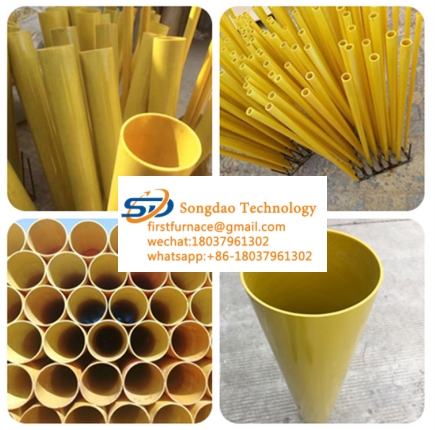- 08
- Jan
Do you know what are the epoxy fiberglass pipes?
Do you know what are the epoxy fiberglass pipes?
Epoxy fiberglass tube is made of electrician alkali-free glass fiber cloth impregnated with epoxy resin, baked, and processed by hot pressing in a forming mold. The cross-section is a round rod. The glass cloth rod has high mechanical properties. Dielectric properties and good machinability. It is suitable for insulating structural parts in electrical equipment, and can be used in damp environment and transformer oil.

Appearance of epoxy fiberglass pipe: The surface should be flat and smooth, free of bubbles, oil and impurities. Color unevenness, scratches, and slight height inequality that do not hinder use are allowed. The epoxy fiberglass pipe with a wall thickness of more than 3mm allows end or There are cracks in the section that do not hinder use.
epoxy ग्लास फाइबर ट्यूब को उत्पादन प्रक्रिया चार प्रकार मा विभाजित गर्न सकिन्छ: गीला रोलिंग, ड्राई रोलिंग, बाहिर निकाल्ने र तार घुमाउरो।
There are many names for epoxy glass fiber tube. Some people call it 3240 epoxy fiberglass tube, and some people call it 3640 epoxy fiberglass tube. It is essentially the same as the epoxy board, but the production process is different.
The glass fiber cloth inside the 3240 epoxy board is a general insulating cloth, while the substrate inside the epoxy glass fiber tube is electronic grade glass fiber cloth. The ability to withstand voltage breakdown is stronger. There are many models of its products, generally including 3240, FR-4, G10, G11 and other four models.
General 3240 epoxy glass fiber tube is suitable for electrical and electronic equipment under medium temperature conditions. The performance of G11 epoxy board is good, and its thermal stress is as high as 288 degrees. Now many units have developed the G12 model, which has higher attributes. It can completely replace the more expensive laminate.
This is the detailed description of the epoxy glass fiber tube: it has high mechanical strength, dielectric properties and good machinability. Generally applicable to electrical equipment such as transformers, blasters, engines, high-speed rails, etc. Simple identification: Its appearance is relatively smooth, without bubbles, oil stains, and feels smooth to the touch. And the color looks very natural, without cracks. For epoxy glass fiber pipes with a wall thickness of more than 3mm, it is allowed to have cracks that do not hinder the use of the end face or cross section. The 3640 model can be understood as an enhanced version of the 3240.
